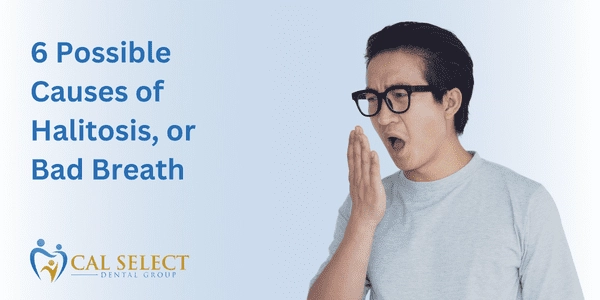
Halitosis, otherwise referred as "bad breath," happens to everyone. If you’ve ever gotten that not-so-fresh feeling during an important moment or you're just talking with friends, you’re not alone.
This is an oral health issue where the main symptom is bad-smelling breath. In most cases, finding the cause is the first step toward treating this preventable condition. Bad breath can happen anytime due to bacteria that naturally lives in your mouth. When you eat, the bacteria in your food is left in your mouth and leaves a foul smell behind.
Reasons why you're experiencing halitosis (bad breath):
1) Certain foods
If you've brushed and brushed but still can't shake the bad breath, the culprit could be what you'd eaten yesterday!
Foods that are high in sulfur such as garlic, aged cheese, tuna, and onions don't go away when they're chewed and swallowed. Once digested, the smelly sulfur is absorbed into the bloodstream and released through your breath. Luckily, this just causes temporary halitosis.
2) Poor oral health care
Without correct and regular brushing, flossing, and dental exams, food particles remain in your mouth. Food that collects on the teeth, gums, and tongue rots and promotes bacterial growth. Consequently, you'll experience an unpleasant odor and taste in the mouth.
3) Cleaning dentures improperly
Dentures require an extra level of care! They not only need to be removed each night, but cleaned each day. If you wear dentures but neglect the cleaning instructions given by your orthodontist or dentist, you may experience bad breath. Why? Dentures are prone to collecting bacteria, fungi, and remaining food particles—all things that cause funky smells!
4) Gum disease (Periodontal disease)
When there's an overwhelming accumulation of plaque (due to poor oral hygiene), your gums become inflamed and irritated. Without treatment, this inflammation results in periodontal disease, causing destruction of the bone and tissues. This breakdown progressively forms pockets between the gums and teeth.
So, how does this cause bad breath? Anaerobic bacteria thrives in the newly-formed pockets. When bacteria breaks down food particles and tissue, it tends to release very smelly sulfur compounds.
5) Dry mouth (Xerostomia)
When there is a major decrease in saliva production, the mouth can't cleanse itself and remove debris and particles left behind by food. Dry mouth may be caused by certain medicines, a salivary gland disorder, or by always breathing through the mouth instead of the nose.
6) Tobacco use
Tobacco products such as cigarettes, cigars, and smokeless tobacco can cause bad breath in a few different ways. First of all, the products themselves contain various chemical compounds that can produce strong and unpleasant odors. Users often experience dry mouth as well, which means there's less saliva to cleanse leftover food.
The most effective way to prevent bad breath is to keep up with your oral hygiene. That means brushing twice a day and seeing your dentist for cleanings. If you're in the California area, schedule your next appointment at Cal Select Dental Group online today!
